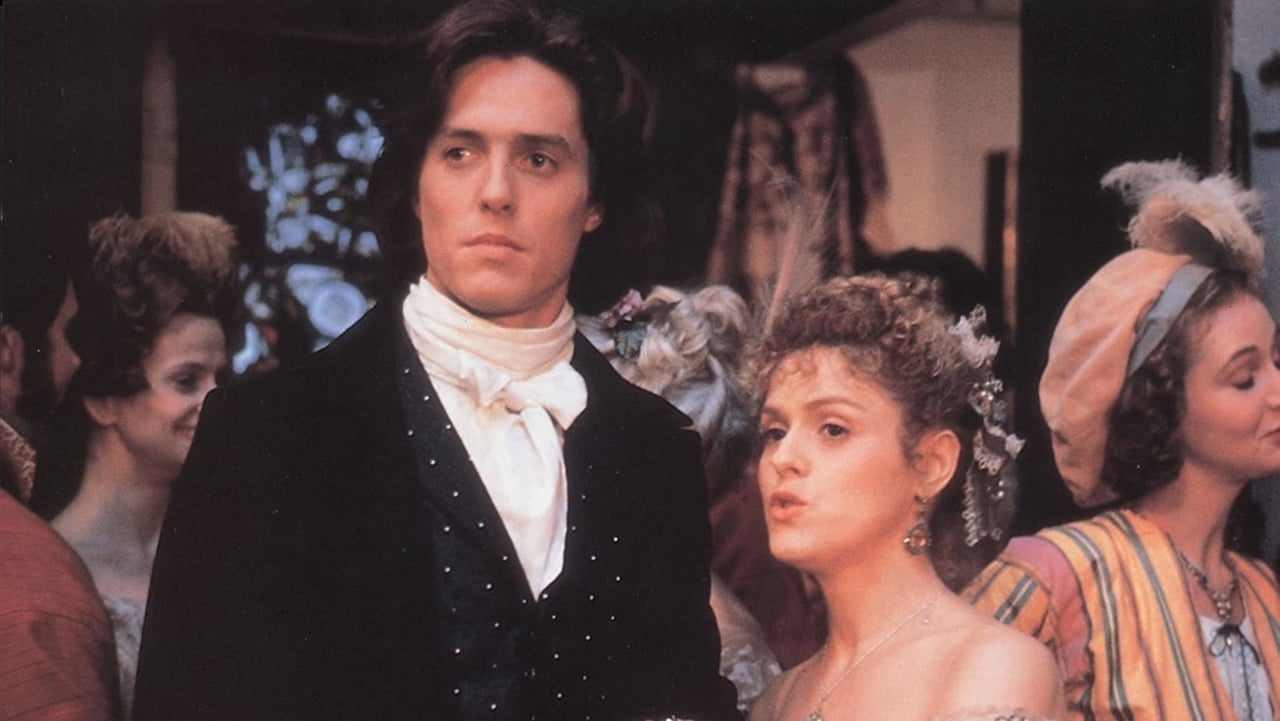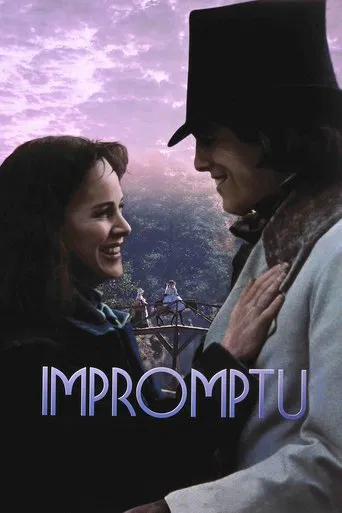

Stylish but barely mediocre overall
... View MoreHorrible, fascist and poorly acted
... View MoreHighly Overrated But Still Good
... View MoreInstead, you get a movie that's enjoyable enough, but leaves you feeling like it could have been much, much more.
... View MoreOne of the most delightful of later day music films, the music of Chopin being used throughout and only to advantage and to the flattery of the composer, which he undoubtedly deserves. Judy Davis is perfect as George Sand and couldn't be better, so you wonder if she really could have been that good in reality - her reputation and reports tell a slightly less flattering story. Julian Sands is another perfect impersonation of Franz Liszt, whose poor Marie d'Agoult is perhaps the most convincing of all in her very uncomfortable situation. Emma Thompson is yet another triumph of the play, perhaps the best actor of them all, while to Alfred de Musset and his excesses and exaggerated feelings there are no holds barred - he appears to have been even worse in reality. It's a wonderful play all through, and the most astonishing bit is perhaps how good Hugh Grant is as Chopin - you never expected such a character out of him, but he even makes it convincing. Cornel Wilde, however good, was not that convincing in "A Song to Remember" in 1945 with Merle Oberon as a less realistic George Sand, which film however is good to remember in this connection. This is a charming story, no matter how constructed, and gives pretty much a true impression of the romantic circles and their intrigues and sophisticated maneuvers in Paris around 1835. A must for all music lovers, and especially Chopin lovers.
... View MoreAn insult to the memory of one of the greatest, if not the greatest music composers of all times.The director and writers should change profession and use the spare time to learn how to do proper research.Why does Hugh grant needs to speak in a pseudo polish-Russian-god knows what accent in a movie where everyone is speaking English and pretending being french without french accents? If Chopin was German or British or French surely this movie would have been burnt...Surely they can't take the fact that one of the greatest comes from Poland.But then if you have an IQ below 50 and you love soap operas this movie is for you! I can change my review for you.Alternative review: Great movie, I, I ve learned a lot about history and music and Hugh Grant should have been awarded an Oscar for that true some portrait of the music composer.
... View MoreSometimes you just like a movie. I admit I was prepared to like this. It features Chopin, and he is a large part of my musical world. His stuff really is magical, but only when flowing through a rich vessel. The things he wrote when he was with Sands are a touchstone of sorts for sustained passion, the kind that roots you to air.And. And it has Judy. She seems to have made some very bad choices in projects, a situation I cannot understand. But when she's tuned in, she gives echoes of just the sort of passion I hear from Frederic. She's tuned in here, despite the ordinary direction. Her character is close to the one that initially impressed me, in her brilliant career. Judy is capable of folded acting, giving us emotion directly from a character and at the same time standing as the writer (here, the writer) reporting that emotion and the immediate context to us. It seems to have been perfected by Australian actresses.Plus, we have Emma Thompson. She's so early in her career she wasn't billed so that I could find, so she was a real surprise. She inserts an Austen-derived character, a brunette, moneyed dope wishing to become sharper by rubbing against artists. The script is ordinary, riskless, surprisingly so. But it has one clever moment when the artists assembled in her country home give a play that makes serious fun of their hosts. Two other joys; the men playing Chopin and Liszt actually do play the piano. And finally, through the whole thing we hear Chopin pieces. They aren't performed by passionate, controlled pianists, but any Chopin in a film is welcome stuff. I think on my film site, I'll have a list of films that have Chopin pieces as central. You'll be surprised how many there are. "Five Easy Pieces" and "Autumn Sonata" are the obvious ones.All this, plus a nice opening scene of our writer as a redheaded girl, are enough to give you pleasure. It almost helps that the direction and story are lifeless. They don't challenge. Its as if we had Chopin perform for us, giving us the harvest of his pain and none of the pain itself.Hugh Grant is wrong for Chopin, but apt for the placeholder named Chopin in this film. He has only one good scene, where he worries over an impromptu that seems contrived. It should reflect spontaneity, he thinks. It isn't that it needs to be actually spontaneous, but that it be crafted in such a way that gives that impression. What is the impression of spontaneity? If you have a chance, check out Martha Argerich, in her 1965 recording. You want overflowing passion that seems always on the edge of falling but is shaped smoothly? You will never be the same. Thank George Sand, I think.The one really dire problem is that they used his piano music without regard to whether it would have been then written.Ted's Evaluation -- 3 of 3: Worth watching.
... View MoreImpromptu (1991) Starring Judi Davis, Hugh Grant, Bernadette Peters, Ralph Brown, Julian Sands, Mandi Patinkin..Directed By James Lapine Judi Davis is doing what I feel is an Oscar winning performance as French feminist radical cross-dressing author George Sand, who is ultimately a woman who belongs to no one and who lives life to the fullest. She has raised children to be as creative as she is and taken full responsibility for her children as well as for her elderly mother. Bored of the dull life after her divorce from the father of her children, she takes her current lover to the French countryside. There, she is invited by a wealthy hostess to her estate. The drama heightens in a soap opera sort of way when none other than Alfred De Musset the poet and ex-lover of Sand shows up. Her jealous boyfriend, Malfitte, challenges him to a duel. Meanwhile, Sand has fallen for Chopin, who is her polar opposite. While she is free, intense, devil-may-care and very healthy, Chopin is reserved, emotional, sensitive, refined and suffering of bad health with tuberculosis. Their relationship is accurate to truth but not in the way the film depicts. The disaster that happens in the country estate, comedically produced, never really happened. Bernadette Peters delivers a terrific performance as well as the scheming and bitter Marie D'Agoult, whose own marriage to Franz Liszt after having many children with him, including Cosima who later marries Richard Wagner, but that's another story and even another movie. This is a well-done movie with lots of charm and witty scenes. I especially enjoyed the entire portion in the country estate, in which the artist Delacroix, Franz Liszt and Chopin discuss over dinner the existence of God in front of a priest, put on a satirical farce play that ends badly and Sand's adorable children who are always finding some excuse to play with explosives and dynamite.This 1991 movie directed by James Lepine is an absolute charm. It's a romantic comedy, it's a historical piece and a colorful introduction to the music of Frederic Chopin, Franz Liszt and the life and writings of Madame George Sand Aurore Dudevant. The romantic comedy is well-written, the actors are doing top-notch performances and the music is heaven. I don't know yet if there is a soundtrack but it's likely there is and it must be beautiful. George Sand was the pen name of the feminist writer Aurore Dudevant who scandalized proper Victorian society in the 19th century by dressing as a man, smoking cigars, abandoning her wealthy and respected husband to live the liberal lifestyle of a bohemian writer of novels. She had many lovers, including Alfred De Musset (who is played in this film by Mandy Patinkin)and her most famous lover, Frederic Chopin. It is their love story that this movie focuses on. Stars Judi Davis as George Sand, Hugh Grant as Chopin and Bernadette Peters as the Countess Marie D'Agoult. I will not give away the answer. But Chopin, though he never married Sand, was greatly influenced by his knowing her and his most productive period of composing piano music came after their heartbreaking separation. Chopin died young of tuberculosis. It's very possible that he loved George Sand but I'm thinking that for Sand, no man was really ever good enough for her. After all, she was the embodiment of the feminist, independent single woman who did'nt really need marriage or love. Great scenes: Judi Davis must woo Hugh Grant as a man wins a woman (gender role switch because Chopin was very frail and feminine) and Sand was more aggressive. "Art does not apologize" is another great line. Great movie, great music.
... View More